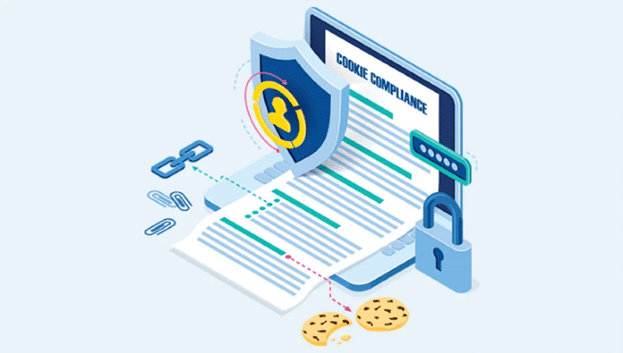As data privacy remains a critical concern, organizations must routinely reassess how they manage and/or handle private user information, including the use of cookies.
In this blog, we will explore three key reasons on why maintaining an up-to-date cookie compliance program is essential for minimizing risks, upholding regulations, and building trust with consumers.

What are Cookies?
Cookies are small pieces of data stored on a user’s device when they visit a website. They are commonly used to remember specifics, such as login information details or monitoring a user’s interactions across different websites they browse through.
While cookies provide a wealth of valuable data for businesses to collect and benefit from, they can also pose as significant liability risks, if not handled properly, especially when it comes to complying with privacy standards. That is why it is imperative to frequently reassess your cookie compliance program for your organization to stay ahead and current with changing privacy protection laws.
Reason #1 – Evolving Cookie Compliance Privacy Regulations
Privacy laws are consistently evolving globally, regulations like the GDPR (General Data Protection Regulation) and CCPA (California Consumer Privacy Act) are frequently updating, requiring organizations to rethink their cookie compliance programs in order to keep their systems compliant. Businesses need to stay vigilant when following protocols to avoid costly fines that may tarnish their image.
For example, the “cookie law” mandates that organizations must retrieve user consent before storing or accessing cookies on their devices. This policy allows users to be informed about what data is being collected and provides them with control over their online privacy.
Strategies for Enhancement
- Adapt to Changing Regulations: Stay current by regularly reviewing and evaluating privacy laws to ensure that your cookie practices align with both new and existing guidelines.
- Audit and Categorize Cookies: Conduct regular audits to verify that both essential and non-essential cookies on the organization’s website align with the user’s consent.
- Essential Cookies: These cookies are required for basic website functions, such as logging in or using an online shopping cart.
- Non-Essential Cookies: These cookies are used for marketing and tracking purposes, such as ads. They may require additional user consent as they are not essential for the core functionality of the website.
Reason #2 – Cookie Compliance Programs Heighten User Expectations And Trust
Continuously refine your cookie compliance program by being transparent about what users are consenting to. When consumers understand how their data is gathered and what it is used for, it will help build trust and demonstrate your commitment in protecting their privacy and adhering to industry standards.
Providing users with control over their cookie preferences, such as the ability to opt in or out, reduces unnecessary data collection and strengthens the trust they place in your organization.
Strategies for Enhancement
- Disclose Cookie Usage and Data Collection: Clearly communicate which cookies are being used and the types of data collected.
- Transparency in this area builds trust and reassures users that their privacy is respected. This gives your organization a competitive edge as you are addressing and alleviating privacy concerns.
- Implement Clear Cookie Consent Banners: Make it easy for users to accept or reject cookies with direct, accessible consent banners. This enhances the user experience and complies with privacy laws.

Reason #3 – Cookie Compliance Programs Help Monitor and Track External Third-Party Cookies
Another critical reason to update your cookie compliance program is to address third-party cookies. As businesses navigate evolving privacy standards, they are required to receive clear user consent before tracking data across multiple websites. Often, users are unaware of the extent to which their data is shared or recorded, making it critical to manage interactions with external third-party services, for example, advertisers, with extra care.
Strategies for Enhancement
- Limit Data Sharing: Establish data-sharing agreements with external platforms to control the amount of information being exchanged. This ensures that data is used only for its intended purpose and minimizes unnecessary exposure.
- Use anonymized data instead of personally identifiable information (PII), to reduce the risk of misuse and protect user privacy. This approach allows you to leverage valuable analytical insights without compromising individual privacy and business integrity.
- Implement Data Retention Policies: Create a clear data retention policy that specifies how long external parties are allowed to store your data. The data retention duration should depend on the type of information collected, its intended use, regulations governing that information, and contractual obligations.
- Once the data has fulfilled its purpose, it should be securely disposed of to make room for newer, relevant information. This helps mitigate the risk of data breaches, prevents unauthorized access, and strengthens overall data security.

A “Cookies Without Consent” Case Study
In March 2025, the California Privacy Protection Agency (CPPA) reached a settlement with American Honda Motor Co. regarding California privacy laws and cookie consent policy violations, resulting in a $632,500 fine. Honda is expected to pay this charge and implement changes to their business practices that better protect consumer privacy.
Some of the key transgressions of Honda included the sharing of consumer personal information with ad tech companies, without producing outlined contracts that address the necessary privacy protection terms. Honda also utilized a privacy management tool that made it difficult for Californians to exercise their privacy rights, in which it became challenging to access, delete, or opt out of the sale of their personal data.
As part of the settlement, Honda is required to certify its compliance, train their employees, and revise their contracting process to ensure that proper safeguards for personal information are set in place.
Although Honda had agreed to implement stronger privacy protections and improve their handling of user data in the future, their reputation has been tarnished by its failing to comply with required privacy regulations. Restoring consumer trust will not be an easy fix.
Key Takeaways
- Given the ongoing uncertainty with privacy regulations and the surge in user expectations, it is essential for organizations to regularly assess and refine their cookie compliance programs. Failure to do so can lead to significant penalties, diminish user trust and confidence, and damage a company’s image, which may take considerable time to repair.
- By prioritizing consumer privacy and taking proactive cookie compliance measures now, organizations can avoid negligence, build robust data governance practices, and lay the foundation for long-term success.
Need Advice? Take The Next Step in Privacy Engineering
Your organization’s data privacy can’t wait. At Myna, we offer:
- Customized privacy engineering solutions
- Compliance-ready frameworks
- Expert implementation support
- Ongoing technical guidance
For further expertise and/or additional insights on Privacy Engineering, please explore our Solutions page. Our team of experts are ready to assist you in navigating the complexities of data privacy and in building secure, protected systems designed to your organization’s specific needs.
For cookie compliance, we offer a range of services including site scanning, cookie categorization, and customizable cookie banners to enhance your compliance strategy.
Ready to secure your data? Book a consultation with our privacy engineering experts today!
Contact Us
REFERENCES
Image 1: Mandatly
Cookie Law: Cookies, the GDPR, and the ePrivacy Directive – GDPR.eu
Essential vs Non-essential Cookies: Cookies, the GDPR, and the ePrivacy Directive – GDPR.eu
Image 2: Boom Visibility
Third-Party Cookies: What Are the Risks of Third-Party Cookies? — Gerrish Legal
Personally Identifiable Information (PII): What is PII? Examples, laws, and standards | CSO Online
Image 3: Bleuwire
Case Study: Honda Settles With CPPA Over Privacy Violations





